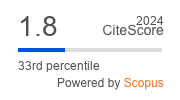E-commerce Recommender System Using PCA and K-Means Clustering
Abstract
Recently, recommender system has an important role in e-commerce to market products for users. One of recommender system approach that used in e-commerce is Collaborative Filtering. This system works by providing product recommendations based on products liked by other users who have similar preferences. However, sparse conditions in user data will cause sparsity problems, namely the system is difficult to provide recommendations because of the lack of important information needed. Therefore, we propose an e-commerce product recommendation system based on Collaborative Filtering using Principal Component Analysis (PCA) and K-Means Clustering. K-Means is used to overcome sparsity problems and to form user clusters to reduce the amount of data that needs to be processed. While PCA is used to reduce data dimensions and improve clustering performance of K-Means. The test results using the sports product dataset on the Olist e-commerce show that the proposed system has a lower RMSE value compared to other methods. For the number of neighbors of 10, 20, 30, and 40, our system obtains values of 0.771806, 0.75747, 0.75304, 0.75304, and 0.75270.
Downloads
References
S. Bandyopadhyay, S. S. Thakur, and J. K. Mandal, “Product recommendation for e-commerce business by applying principal component analysis (PCA) and K-means clustering: benefit for the society,” Innov. Syst. Softw. Eng., vol. 17, no. 1, pp. 45–52, 2021.
Z. K. A. Baizal, D. H. Widyantoro, and N. U. Maulidevi, “Computational model for generating interactions in conversational recommender system based on product functional requirements,” Data Knowl. Eng., vol. 128, no. October 2018, p. 101813, 2020.
J. Choi, S. Yun, and J. Kim, “Improvement of Data Sparsity and Scalability Problems in Collaborative Filtering Based Recommendation Systems,” 2020.
M. I. Ardimansyah, A. F. Huda, and Z. K. A. Baizal, “Preprocessing matrix factorization for solving data sparsity on memory-based collaborative filtering,” Proceeding - 2017 3rd Int. Conf. Sci. Inf. Technol. Theory Appl. IT Educ. Ind. Soc. Big Data Era, ICSITech 2017, vol. 2018-Janua, pp. 521–525, 2017.
B. Mulyawan, M. Viny Christanti, and R. Wenas, “Recommendation Product Based on Customer Categorization with K-Means Clustering Method,” IOP Conf. Ser. Mater. Sci. Eng., vol. 508, no. 1, pp. 0–6, 2019.
R. Ananda, M. Zidny Naf’an, A. B. Arifa, and A. Burhanuddin, “Sistem Rekomendasi Pemilihan Peminatan Menggunakan Density Canopy K-Means,” RESTI (Rekayasa Sist. dan Teknol. Informasi), vol. 4, no. 1, pp. 172–179, 2020.
and A. M. and others Yadav, Vikash, Rati Shukla, Aprna Tripathi, “A New Approach for Movie Recommender System using K-means Clustering and PCA,” J. Sci. Ind. Res., vol. 80, no. 2, pp. 159–165, 2021.
C. Langensiepen, A. Cripps, and R. Cant, “Using PCA and K-Means to predict likeable songs from playlist information,” Proc. - 2018 UKSim-AMSS 20th Int. Conf. Model. Simulation, UKSim 2018, pp. 26–31, 2018.
H. Zarzour, Z. Al-sharif, M. Al-ayyoub, and Y. Jararweh, “A New Collaborative Filtering Recommendation Algorithm Based on Dimensionality Reduction and Clustering Techniques,” 2018 9th Int. Conf. Inf. Commun. Syst. ICICS 2018, vol. 2018-Janua, pp. 102–106, 2018.
[M. Singh, “Scalability and sparsity issues in recommender datasets: a survey,” Knowl. Inf. Syst., vol. 62, no. 1, pp. 1–43, 2020.
W. Hong-Xia, An Improved Collaborative Filtering Recommendation Algorithm, vol. 1. Springer International Publishing, 2019.
T. Li, P. Ye, and S. Zheng, “State grid office system user clustering analysis based on K-means algorithm,” 2018 IEEE 3rd Int. Conf. Big Data Anal. ICBDA 2018, pp. 438–442, 2018.
M. K. Gupta and P. Chandra, “An Empirical Evaluation of K-Means Clustering Algorithm Using Different Distance/Similarity Metrics,” Lecture Notes in Electrical Engineering, vol. 605. pp. 884–892, 2020.
P. K. Singh, P. K. Dutta Pramanik, A. K. Dey, and P. Choudhury, “Recommender systems: An overview, research trends, and future directions,” Int. J. Bus. Syst. Res., vol. 15, no. 1, pp. 14–52, 2021.
H. Zarzour, Y. Jararweh, and Z. A. Al-Sharif, “An Effective Model-Based Trust Collaborative Filtering for Explainable Recommendations,” 2020 11th Int. Conf. Inf. Commun. Syst. ICICS 2020, pp. 238–242, 2020.
M. Rahul, P. Pal, V. Yadav, D. K. Dellwar, and S. Singh, “Impact of similarity measures in K-means clustering method used in movie recommender systems,” IOP Conf. Ser. Mater. Sci. Eng., vol. 1022, no. 1, 2021.
P. K. Singh, P. K. D. Pramanik, and P. Choudhury, “Collaborative Filtering in Recommender Systems: Technicalities, Challenges, Applications, and Research Trends,” New Age Anal., pp. 183–215, 2020.
P. Kumar and R. S. Thakur, “Recommendation system techniques and related issues: a survey,” Int. J. Inf. Technol., vol. 10, no. 4, pp. 495–501, 2018.
M. Chen and P. Liu, “Performance evaluation of recommender systems,” Int. J. Performability Eng., vol. 13, no. 8, pp. 1246–1256, 2017.
Copyright (c) 2022 Jurnal RESTI (Rekayasa Sistem dan Teknologi Informasi)

This work is licensed under a Creative Commons Attribution 4.0 International License.
Copyright in each article belongs to the author
- The author acknowledges that the RESTI Journal (System Engineering and Information Technology) is the first publisher to publish with a license Creative Commons Attribution 4.0 International License.
- Authors can enter writing separately, arrange the non-exclusive distribution of manuscripts that have been published in this journal into other versions (eg sent to the author's institutional repository, publication in a book, etc.), by acknowledging that the manuscript has been published for the first time in the RESTI (Rekayasa Sistem dan Teknologi Informasi) journal ;








